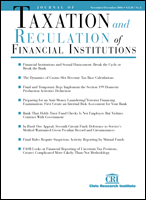Complete Issue
Author: Houman Shadab.
Source: Volume 27, Number 05, May/June 2014 , pp.1-60(60)

< previous article |return to table of contents
Abstract:
Banks and other lending institutions owning the debt of a distressed borrower are increasingly to sell its assets as an exit instead of dealing with a corporate reorganization. In our first article, authors Peter C. Blain, Michael D. Jankowski and L. Katie Mason explain that this is due to debtors increasingly contesting reorganization plans that would leave their owners with equity, the inability of debtors to obtain financing due to being overleveraged, and the willingness of bankruptcy courts to approve asset sales. The authors explore the players and process involved in a sale of business under Section 363 of the Bankruptcy Code. Another issue of direct interest to lenders is covered in this issue’s second article, by Zachary G. Newman, Yoon-Jee Kim, and Alison M.C. Schrag. The authors discuss how commercial borrowers are using fraud-based defenses, more typically relied upon by consumer borrowers, to prevent the lender’s enforcement of a credit facility. The authors review representative cases in the area and offer practical suggestions to both lenders in the midst of such litigation and those seeking to avoid fraud-based defenses. The tax consequences of certain cross-border debt investments is the subject of our third article. Stanley C. Ruchelman addresses two discussion drafts issued by the Organization for Economic Co-operation and Development (OECD) on March 19, 2014, which seek to undermine abusive tax planning using hybrid mismatch arrangements. Such mismatches allow both borrowers and lenders to receivable favorable tax treatment from debt expenses and income. The OECD’s proposals are relevant to hedge funds and other cross-border investors in debt obligations. Edward T. Kang and Brian D. Frey, in our issue’s fourth article, identify and discuss aspects of the Foreign Corrupt Practices Act (FCPA) relevant to financial institutions. The authors discuss the potential theories of liability that may be asserted against financial institutions and the related issue of FCPA whistle blower liability. The article is especially timely given reports in April 2014 that the asset manager Och-Ziff Capital Management Group is being investigated for FCPA violations in Congo. Individual Retirement Accounts (IRAs) are analyzed by Ira G. Bogner and Emily Erstling in our Compensaton and Benefits column. The authors focus on issues relevant to IRA owners, trustees, and custodians, including permitted investments, unrelated business income tax, valuation for tax purposes, and recent tax and nontax decisions relating to prohibited transactions. This issues rounds out with a Tax Developments column, in which Kit Dickson, Chris Brown, Pam Gordon, Ted Dougherty, Jim Calzaretta, and Amy Sutton address two topics related to asset management: the April 2014 decision by the Court of Justice of the European Union in Emerging Markets Series of DFA Investment Trust Company v. Dyrektor Izby Skarbowej w Bydgoszczy1 and, on the domestic front, Treasury’s new final and proposed regulations covering the net investment income tax.Keywords: Chapter 11 bankruptcy; Section 363 sale; fraudulent inducement to borrow; merger and integration; cross-border investments; hybrid financial instruments; Foreign Corrupt Practices Act; IRAs; E.U. withholding tax claims; DFA Investments decision; net
Affiliations:
1: New York Law School.